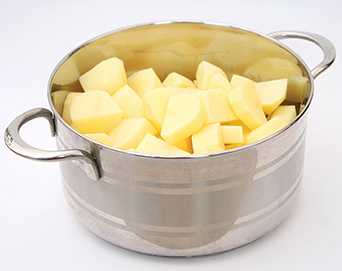1.2 A German dinner party
The next intercultural encounter features a British journalist, working in Germany, and his perceptions of a German dinner party.
Dinner parties are a very common type of social occasion and may generate intercultural encounters. The text you are about to read is a personal account of such an encounter. You will probably notice that the author uses two types of argument in his discussion of the experience. The first is argument by analogy, which involves comparing two things in order to highlight a perceived similarity. By its nature, an analogy offers a simplified view of an idea or process – an illustration, rather than a detailed analysis. The second is generalisation, which involves basing general propositions on the observation of particular details. Both are flawed forms of argumentation: analogies invariably break down, while generalisations often prove unsustainable in the face of further evidence. Neither is to be trusted when trying to make sense of other cultures.
Activity 2
Read the article and identify three generalisations and one argument by analogy made by the author.
Reading 1 Frugality rules at German dinner parties
There has been much talk in Germany about southern European nations being over-reliant on the country’s generosity but when it comes to entertaining, the Germans display quite an appetite for frugality.
When I first came to live in Berlin, I was invited to a dinner party, a media dinner party. A German director and his wife invited me over and I looked forward to it with great anticipation.
Usually dinner parties are not my cup of tea, as it were, but this would be a chance to see how Germans did these things. A correspondent from The Economist had also been invited.
And it was good, very enjoyable – though not nearly as grand a meal as I had anticipated.
The table was laid in the couple’s flat. We chatted a little, anticipation mounting.
And then his wife proudly produced the food – boiled potatoes, boiled green vegetables and ham, boiled ham.
Now I like boiled potatoes, boiled ham, boiled vegetables even.
But it is not what you would have expected in a similar British dinner.
That would have been a feast, produced to the dictates of Delia, Jamie or Heston and probably involving porcini and crème fraiche, the words the English upper-crust use for mushrooms and sour cream.
The point I am making is that the German idea of luxury is different from the British idea.
Germans really are frugal. They like boiled potatoes – and good for them, say I.
You might argue that this was Berlin and Berlin was, of course, partly in East Germany. So Berlin frugality has a different background. And it is true that East Berliners were mocked by ‘Wessies’ when the wall came down because they knew nothing about fancy food.
Just after the two halves of the city were reunited, a West German magazine [Titanic] had a cover story with a picture of an East German housewife. You could tell where she came from because of her awful East German perm. She is holding a cucumber and the caption says: ‘My first banana’.
The point is that bananas were such a luxury that East Germans could not even recognise one.
But the hosts at my dinner party were not ‘Ossies’ but ‘Wessies’, completely au fait with bananas and even, perhaps, porcini.
No, this was just German frugality. You come across it in lots of ways.
I go to a supermarket under a railway arch and it resembles a warehouse, goods stacked to the red-bricked roof with no sense of style or flashy salesmanship.
It is price that matters – even for fancy wines.
This is not a supermarket for poor people. There is wine there at 60 euros (£48/$76) a bottle. But you can bet your bottom euro that it will be cheaper than elsewhere. Even the rich watch the pennies.
Or think of Media Markt, the electronics retailer, which still refuses to take credit cards or even debit cards.
When I presented a card at the check-out, the assistant looked at me like I had offered to pay with a chicken or the use of my body for half an hour. Credit: nein danke.
So as you follow the debate over the euro, and over German resistance to extra spending in Greece, or extra spending in Brussels, bear this frugality in mind. It is seared into the German soul.
[…]
Much is made of the effects of the inflation of 1923, but to my mind that is overblown – a cliché almost.
Far more important are the effects of the World War II, which are less talked about, partly because German suffering became unmentionable because of guilt.
But it was a personal catastrophe for millions of people. Half the homes in Germany were uninhabitable, either destroyed or damaged.
So these are people who experienced great privation, and within living memory. American cigarettes became a currency as people scrabbled for food.
In this city of Berlin, for example, women – Trümmerfrauen (rubble women) – scrabbled through the streets, scavenging in the years after the war. That kind of experience has to inform your attitude to food and material goods.
On top of that, Germans do not actually earn very much compared to those in other European countries – less than in France and Spain and about two-thirds what a comparable British worker has.
And the German wage has barely risen over the past decade. They are frugal because they hold back on pay.
Accordingly, Germans hold their wallets tight to themselves.
Frugal at the dinner table. Frugal too, in the finance ministry.
Note: Delia (Smith) is a TV cook and cookery writer in the UK, and Jamie (Oliver) and Heston (Blumenthal) are ‘celebrity chefs’. Titanic was a satirical magazine, so the cover photo described was obviously a joke. Far from not being able to recognise bananas, after the fall of the Berlin Wall, East Germans used to buy large quantities of bananas in the West to take home.
Answer
Argument by analogy: ‘Frugal at the dinner table. Frugal too, in the finance ministry.’
Generalisations include:
- Germans are frugal.
- British dinner parties are feasts, cooked to the dictates of celebrity chefs.
- The German idea of luxury is different from the British one.
- Germans like boiled potatoes.
- Germans hold on tightly to their wallets.
Activity 3
Read the article again, and answer the following questions.
1 How many dinner parties does the author of this article report on?
Answer
The article seems to be based on only one dinner party.
2 What trait does the author attribute to Germans in general, on the basis of his experience?
Answer
The author generalises that Germans are frugal.
3 What cultural difference between Britain and Germany does he write about, on the basis of this dinner party?
Answer
The author asserts that ‘the German idea of luxury is different from the British idea’.
4 Which historical event does the author suggest contributed to the perceived German frugality?
Answer
He attributes this difference to the widespread poverty and hardship that followed the Second World War.
5 What three examples does the author use to support his conclusions about German frugality?
Answer
The author uses four examples:
- the fact that his local supermarket resembles a warehouse, and puts low prices before ‘flashy’ sales techniques
- the insistence of the Media Markt electronics chain on payment in cash
- the fact that German wages are low.
Activity 4
Think about the following questions, which are designed to help you evaluate the arguments presented in this article.
1 The author concludes his article by drawing an analogy between German culinary preferences and economic practices: ‘Frugal at the dinner table. Frugal too, in the finance ministry’. How robust, in your view, is this analogy?
Discussion
As you saw in the introduction to this activity, analogies always break down. The analogy between German culinary preferences and economic practices does not seem strong. In a country as large and as varied as Germany, food preferences and specialities are often regional and frequently reflect traditions that have been established over centuries. Economic policy is more likely to be a complex and conscious response to the perceived needs of the present moment, which takes into account Germany’s wider responsibility as the leading economic power in the eurozone. The author is basing his observation on just one dinner party, which is a very small sample, and the menu choice could have been down to the hosts’ preferences as an individual couple.
2 Discuss the following statement on the basis of your own experience and supporting your comments with evidence:
‘a similar British dinner … would have been a feast, produced to the dictates of Delia, Jamie or Heston and probably involving porcini and crème fraiche …’
Discussion
The author’s statement refers to three TV personalities, Delia Smith, Jamie Oliver and Heston Blumenthal, each of whom has a distinctly different approach to culinary matters. It is doubtful whether the average British household has the expertise, or the equipment, to cook in Blumenthal’s highly technical way. His mention of porcini and crème fraiche, which are arguably ‘foreign’, fashionable ingredients, coupled with the TV cook name-dropping, implies that the author’s idea of a British dinner party seems much more trend-oriented than the German soirée he attended, and he explicitly contrasts his idea of a British dinner ‘feast’ with the German frugal fare. It could be argued that he is generalising though with both ‘national’ examples, and that the author’s experience of dining out seems restricted to a relatively small segment of the population, both socially and regionally.

